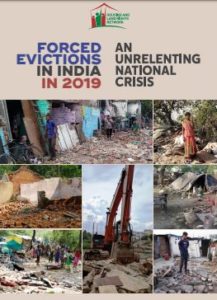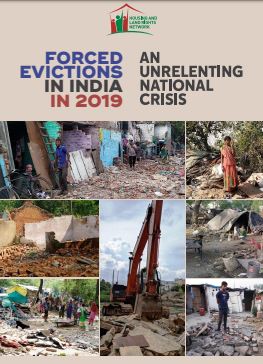The report documents forced evictions in India over the last three years, highlights the severe and long-term human rights impacts on affected persons, and makes recommendations to the government to address this serious but silent crisis of forced evictions and demolitions of homes of low-income communities.

The report is available online at: https://www.hlrn.org.in/documents/Forced_Evictions_2019.pdf
FROM 2017 TO 2019, ACROSS URBAN AND RURAL INDIA, HLRN FOUND:
Over 117,770 houses demolished | Over 568,000 people forcibly evicted from their homes by the state
———————————————————————————-
On average:
About 190,000 people evicted from their homes every year | At least 108 houses demolished daily
About 519 people lost their homes every day | At least 22 people evicted every hour
———————————————————————————–
Currently, nearly 15 million people live under the threat of eviction and displacement in India
While the above figures are alarming, they are a conservative estimate and present just a part of the real picture, as they only reflect cases known to HLRN. The total number of people evicted and displaced in India as well as those under risk of eviction, therefore, is likely to be much higher than documented.
Key findings from HLRN’s research on forced evictions in India in 2017, 2018, and 2019:
- Forced evictions of the urban and rural poor and demolitions of their homes occurred across the country –in megacities, smaller cities, towns, and villages.
- Just in 2019, the state demolished at least 22,250 houses and evicted over 107,600 people.
- Evictions were carried out for a range of reasons and under various guises, including: ‘slumclearance/encroachment-removal/city-beautification’ drives [46 per cent of affected people]; infrastructure and ostensible ‘development’ projects [27 per cent]; environmental projects, forest protection, and wildlife conservation [17 per cent]; ‘disaster management’ efforts [7 per cent]; and other reasons such as political rallies [3 per cent of the total affected population].
- In nearly all of the documented cases of forced eviction, state authorities did not follow due process
established by national and international human rights standards. - Resettlement was provided in only about 26 per cent of the documented cases of eviction in 2019 for which information is available [29 per cent of the recorded incidents in 2018 and 2019]. In the absence of resettlement for the vast majority, affected persons have had to make their own provisions for alternative housing or have been rendered homeless. For those who received some form of resettlement from the state, the sites they have been relocated to are remote and devoid of adequate housing and essential civic and social infrastructure facilities.
- All incidents of forced eviction documented by HLRN have resulted in multiple, and often gross, human rights violations. Children, women, persons with disabilities, older persons, Dalits/Scheduled Castes, Housing and Land Rights Network, Press Release, 18 August 2020 2 Scheduled Tribes/Adivasis, and other marginalized groups have suffered disproportionately from the loss of their homes and habitats.
- Through these persistent acts of eviction and demolition of homes, central and state government authorities have violated national laws, policies, and schemes and international laws and norms.
- The majority of evicted people do not have access to justice and their right to effective remedy has not been fulfilled.
- In 2019, court orders, including of High Courts, estate courts, and the National Green Tribunal, were responsible for the eviction of over 20,500 people.
- Over 14.9 million people across India are currently faced with the threat of eviction and displacement from infrastructure and environmental projects, ‘disaster management’ efforts, and ‘city-beautification/slumclearance’ drives.
Housing and Land Rights Network strongly condemns the continued occurrence of forced evictions and
demolition of homes of low-income and marginalized communities. HLRN callS on the state, at all levels, to:
- Impose an immediate national moratorium on evictions.
- Provide adequate rehabilitation, consistent with international standards, including compensation for material and non-material losses, and support evicted families to rebuild their homes at the same site if vacant, or provide adequate alternative housing with basic facilities within a vicinity of 2–3 kilometres.
- Investigate all acts of forced eviction and fire in ‘informal settlements’ – according to the law.
- Pass housing rights legislation that upholds the human right to adequate housing, as guaranteed in
international law. Provide affordable adequate housing options along a continuum, including social rental housing, hostels, and collective housing options. Focus on the ‘Housing First’ approach prioritizing the provision of homes to homeless persons and families. - Pass a right to homestead law to provide land to the landless for housing and subsistence livelihoods.
- Ensure that ‘eviction impact assessments’ are carried out prior to any eviction/relocation.
- Comply with international human rights standards, including in all state housing policies.
- Implement recommendations of UN human rights bodies, including of relevant Special Rapporteurs.
Forced evictions not only violate human rights laws, but also reflect a continuing systematic dispossession of the poor. Persistent acts of home demolition and eviction directly contribute to a rise in homelessness, landlessness, displacement, impoverishment, and income inequality. Affected persons suffer multiple human rights violations as well as a considerable deterioration in their standard of living. This adversely impedes human development and national progress. The COVID-19 pandemic has reiterated the importance of adequate housing as a key determinant of health, safety, and life. Any state that is concerned about economic and social justice, and is serious about meeting its legal obligations must uphold the right to housing of its people, including addressing on an urgent basis, the crisis of forced evictions.
